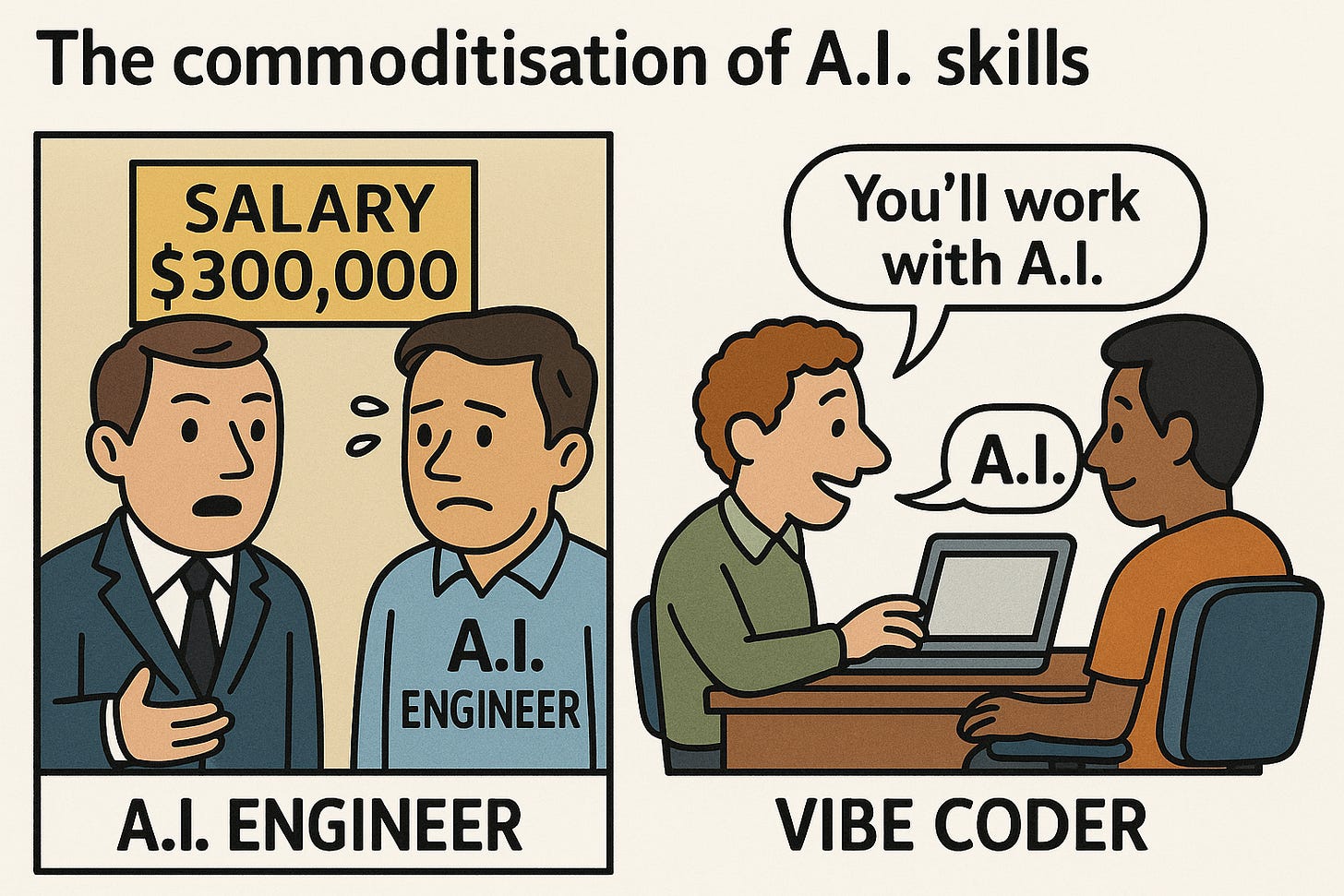Do You Really Need an A.I. Engineer, or Just Smarter Developers?
AI talent once demanded sky-high salaries, but new tools shift value to generalist developers mastering “vibe coding” efficiency
The market for artificial intelligence talent is overheated. Six-figure salaries for “A.I. engineers” are common, with some firms paying north of $300,000 for expertise in machine learning. Yet for most organisations outside the tech giants, this is an unnecessary expense. The strategic mistake many leaders make is assuming that building with A.I. requires specialised engineers. In reality, the shift is towards a new paradigm: vibe coding—a workflow where generalist developers use large language models to generate, adapt and deploy code at speed.
This is not a matter of cutting corners; it is a matter of competitive efficiency. The capability to integrate A.I. into products and processes no longer hinges on rarefied machine learning expertise. What matters is a developer’s ability to orchestrate tools, manage prompts and validate results. Companies that continue to hire for legacy definitions of “A.I. talent” risk overpaying for a skill set that is rapidly being commoditised.
What matters is a developer’s ability to orchestrate tools, manage prompts and validate results
The commoditisation of A.I. skills
Just five years ago, data science and machine learning required highly specialised training. Today, the open-source ecosystem—Hugging Face, LangChain, vector databases—has abstracted much of that complexity. Large language models provide out-of-the-box intelligence that developers can harness without needing to build models from scratch.
Research from McKinsey this year highlighted that more than 60 per cent of organisations experimenting with generative A.I. are doing so without dedicated A.I. teams. Instead, they are tasking existing software engineers with embedding A.I. into workflows. The bottleneck is no longer mathematical expertise; it is product imagination and integration discipline.
Vibe coding as the new workflow
“Vibe coding” is shorthand for using generative models to sketch, refine and debug software through conversational prompts. It is not a gimmick. Developers report productivity gains of 30 to 50 per cent using co-pilot tools. The engineer’s role shifts from writing boilerplate code to curating, editing and aligning machine outputs with business logic.
This lowers the barrier to entry for companies. Instead of hiring scarce (and expensive) A.I. engineers, organisations can reskill existing teams to work effectively with LLMs. Upskilling costs a fraction of a single engineer’s salary and scales across the workforce. The return on investment is higher resilience, broader capability and faster iteration cycles.
Strategic implications for leaders
Reassess hiring strategies. In most industries, it is more cost-effective to train generalist developers to leverage A.I. than to hire specialist engineers.
Prioritise integration over invention. The real strategic play is embedding A.I. into workflows—such as customer service, product design, and operations—not building models in-house.
Focus on governance. The key risk is not a lack of A.I. engineering talent, but rather a lack of oversight—ensuring that outputs are accurate, secure, and compliant.
Who still needs A.I. engineers?
There remain cases where A.I. engineers are indispensable—developing frontier models, building proprietary architectures, or creating deeply customised systems. But this is the territory of OpenAI, Google DeepMind, Anthropic and a handful of hedge funds and biotech firms. For > 95 per cent of companies, the cost of recruiting such talent outweighs the potential benefits.
The next frontier: developers as orchestrators
The strategic shift is clear. The value is no longer in hiring for scarce expertise but in equipping generalists with the right tools and mindset. Developers are becoming orchestrators of intelligence, not just coders. The winners will be firms that recognise this early—investing in upskilling, building flexible teams and resisting the reflex to chase prestige hires.
Hiring an A.I. engineer today may signal ambition, but in most cases, it signals a misunderstanding. The future lies not in hiring for the illusion of scarcity but in building capability where it matters: among the teams you already have.
Developers are becoming orchestrators of intelligence, not just coders



Unfortunately, those shifts are not happening. AI is seen as a quick fix and not a thoughtful one. Sorry for the rebuttal. Proves I’m not an AI. AI would never apologize.
Actually you need a developer that has learned how to develop THEMSELVES without asking an AI. At least then, the code might be correct and/or debugged. If they need help to know how to develop they can ask a SUITABLY EXPERIENCED developer. We haven’t all died off yet.